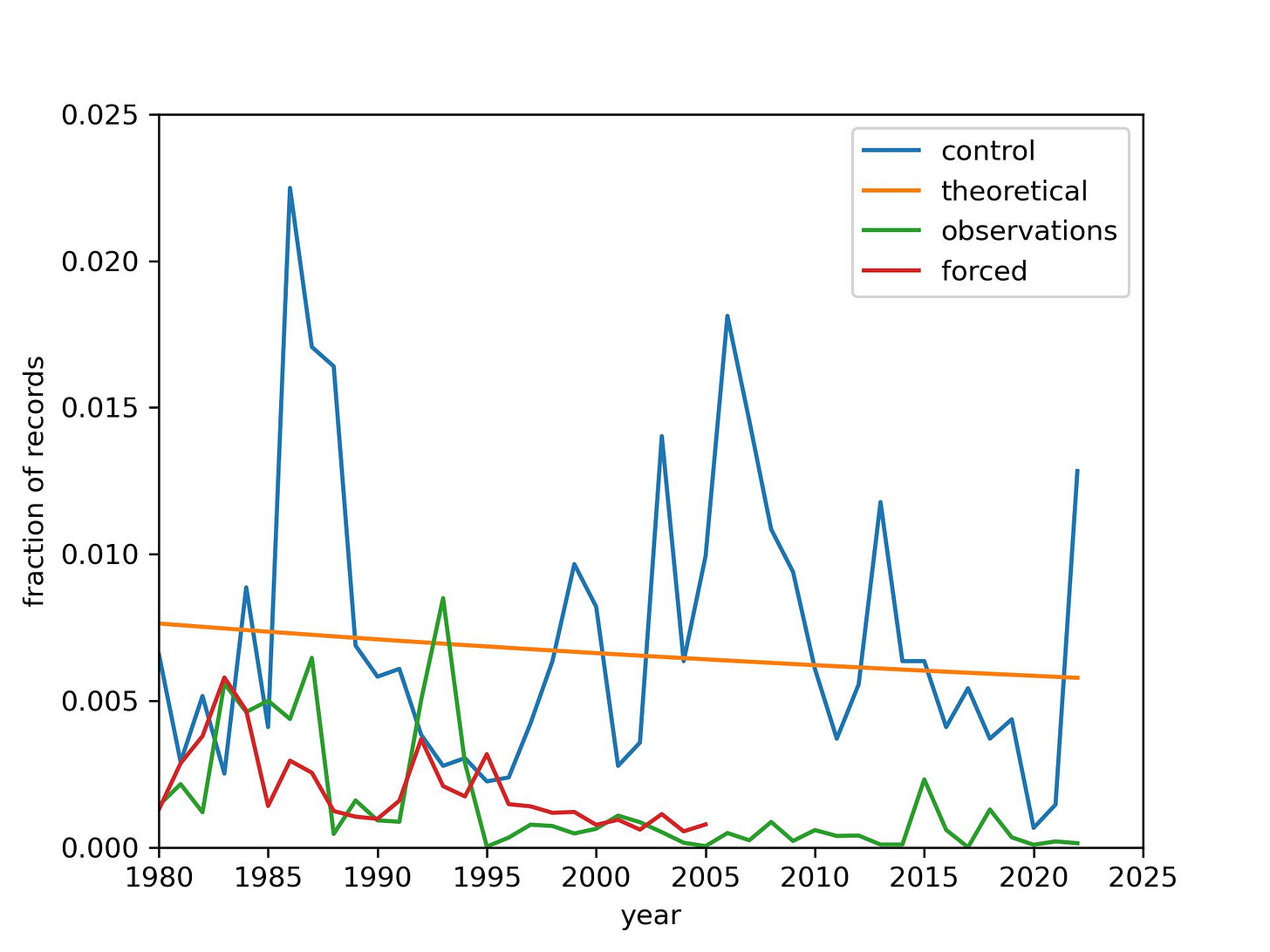TCB Quick Hit: the January 2024 cold wave
Get ready for a blizzard ... of bullshit
A blizzard is coming … a blizzard of bullshit that is. This post will help you understand the implications of the upcoming cold event that will cover much of the U.S.
“It’s cold, therefore climate change is a hoax”
Nope. Cold events still occur as the climate warms, just less frequently. One of my first TCB posts was about temperature records. In it, I had a version of this plot. It shows the occurrence of cold records as a function of year:
Here are the lines:
The orange line is a theoretical calculation of the frequency with which we expect cold records to occur in a stable climate (i.e., one not warming) as the length of the record gets longer,
the blue line shows the number of cold records in a climate models that has a stable climate (a so-called control run),
the green line shows the actual number of records in the observations,
the red line shows the number of records in a climate model that accurately simulates the warming of the last 150 years (models with historical forcing).
It is clear that cold records are occurring a lot less frequently than they would in a stable climate, which is expected since our climate is not stable.
The upshot: Models and observations confirm that cold events continue to happen. But an event that was once considered normal appears extreme due to the effects of global warming.
“This is caused by climate change”
Other people will argue that climate change makes these cold events more frequent. I am not convinced. Observations do not show increases in cold events over time and models do not simulate it. For example, this is a plot put together by my colleague and Texas State Climatologist, John Nielsen-Gammon:

The plot shows that, on average, Texas’ coldest temperatures are becoming less cold and that extreme cold is occurring less frequently. The 2021 Winter Storm Uri, which caused widespread blackouts in Texas and was viewed as a rare and extreme event at the time, would have a more typical occurrence in the early 20th century.
I should note that I have colleagues that I respect who disagree with this. Ultimately, this question will be settled with more data and analyses. But for now, be skeptical of this claim.
What you should do
Extreme cold doesn’t have much of an impact on places that get very cold regularly (e.g., Minnesota). The impacts are mainly in places that don’t regularly get very cold — think Texas during Winter Storm Uri, which killed a staggering 750 people.
Most of these deaths were not directly due to people getting too cold, but rather the loss of infrastructure: electricity going out, iced roads making it difficult for sick people to reach the emergency room, medically vulnerable people killed by the stress of having no heat or water, etc.
If you’re living in a place that doesn’t get cold very often, make sure you’re ready for being without electricity and stuck in your house. You should have enough medicine to last a week or two and have plans for being out of power for an extended length of time. Hopefully you won’t need those plans, but better safe than sorry.
Related posts
If you’re concerned about Texas power and ERCOT, read Doug Lewin’s indispensable substack





I expect most of people who are moved by arguments that a cold snap (in places with confirmed rising average temperatures that have been experiencing record hot weather extremes at other times) disproves global warming are already climate science deniers who do not merely use the things that climate scientists get wrong to justify rejecting everything climate science gets right but are happy with justify with misleading and made up "alt-facts" as well.
Given we are seeing highest ever average temperatures as well as highest ever emissions the real world is going to hit us with too many new extremes to be squeezed into "false and exaggerated" framing. And the proportion of people who know that it is real and serious and who support strong commitments to emissions reductions will keep growing.
Mainstream politics handing the issue off to fringe politics - in "you care so much, you fix it" style, as much to frame it as fringe as evade responsibility for dealing with it - may have begun as the way to NOT address it; it shouldn't require popular opinion for those holding the highest Offices of responsibility and positions of trust (with duties of care) but I think the real world impacts will only strengthen public demands that it is addressed.
And we are better placed than ever before to commit to low, potentially zero emissions energy at large scale - solar, wind, storage, BEV's all exceeding the mostly pessimistic predictions. Not just massive rates of installation of RE but heavy investment in new solar, wind and battery FACTORIES. IEA estimates are for near 1 TW pa of solar panel production (doubling) within the next two years - at 20% capacity factor that is like 200 1GW coal (or nuclear) plants every year. That much that quickly - and battery factory investments exceed solar and wind combined.
For all the causes for pessimism there remains some real cause for (cautious) optimism - that at least we will evade worst case global warming scenarios. Isn't the taking of the high emissions pathways out of contention due to the unexpected successes of RE?
This seems to be a benefit of warming....a reduction in severe cold events. Has there been any serious analysis of how much a reduction in severe cold events offsets an increase in severe heat events?